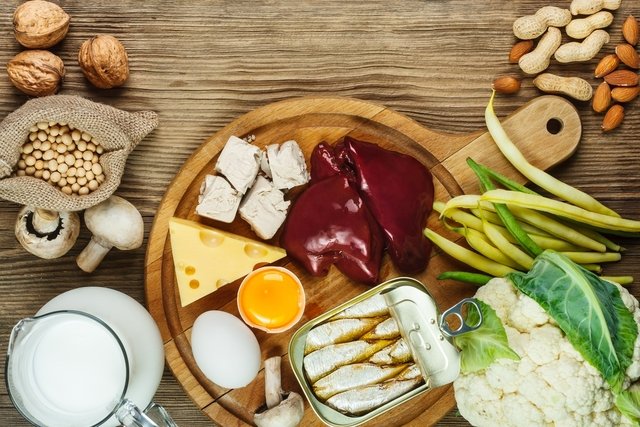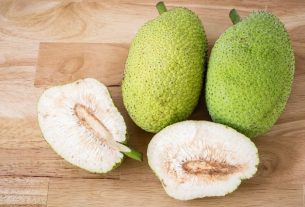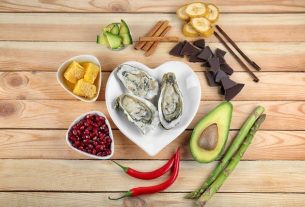Biotin, also known as vitamin H or vitamin B7, is a water-soluble vitamin essential for the proper functioning of the body, as it is related to the production of glycogen and proteins, being important for maintaining the health of skin and hair, ensuring energy in cells and maintain protein production.
This vitamin can be found naturally in foods such as almonds, hazelnuts and whole grains, as well as as a supplement in capsule form, which can be recommended by a doctor or nutritionist when it is not possible to obtain the necessary amount of biotin for the proper functioning of the body through food.

What is it for
Biotin is used for:
- Ensure energy in cellsas it is essential for the production of glycogen, which also helps regulate circulating glucose levels in the blood and, consequently, prevent or control diabetes;
- Maintain adequate protein productionas it helps in the formation of amino acids, which are the forming units of proteins;
- Strengthen nails and hairas it guarantees the formation of proteins that are essential for the health of nails and hair;
- Promote skin healthas in addition to promoting hydration, it guarantees the formation of collagen and keratin by the body, which is a fundamental protein to guarantee the elasticity and resistance of the skin;
- Increase reabsorption in the intestine and use of vitamins B12, B5 and folic acidhelping to maintain the proper functioning of the body;
- Help with the formation of blood cellsmainly lymphocytes and antibodies.
In addition, biotin can also help maintain the health of the nervous system, help treat acne and alopecia, and control cholesterol levels.
Where to find biotin
The following table shows the amount of biotin per 100 grams of food:
In addition to being found in food, biotin is produced by the intestinal flora and, therefore, it is important that foods rich in fiber are consumed and that the person drinks at least 1.5L of water per day, as this way it is possible to maintain good health. intestinal functioning and promote the production of biotin.
2. Biotin supplement
Biotin can also be found in supplement form in capsules, and should be recommended by a doctor or nutritionist when it is not possible to obtain the ideal amount of biotin through diet or when the presence of some signs indicating a lack of biotin is verified, such as hair loss, weak nails, loss of appetite and excessive tiredness.
When indicated: the supplement may be indicated in case of biotinidase deficiency, insufficient intake of biotin in the diet, intestinal malabsorption, in case of alopecia and acne, and may also be recommended for people who want to strengthen their nails and hair and improve the appearance of the skin .
How to use: There is no specific recommendation for the recommended amount of biotin supplement, as it may vary according to the purpose of use. If the use of a biotin supplement is indicated for the treatment of brittle nails, it is recommended to take 2.5 mg once a day for 6 months. The dose of biotin found in some multivitamins (30 mcg or 0.03 mg) is apparently sufficient.
Secundary effects: The use of biotin supplements at the indicated dose is apparently safe and no side effects have been identified.
Contraindications: The biotin supplement should not be used in people with hypersensitivity to any component present in the formula, and is also not recommended for pregnant or breastfeeding women, unless recommended by a doctor.
Bibliography
- EXAMINE.COM. Biotin. Available at: <https://examine.com/supplements/biotin/>. Accessed on Aug 24, 2022
- IBEROCHEMISTRY. Biotin. 2017. Available at: <https://www.iberoquimica.com.br/Arquivos/Insumo/arquivo-115609.pdf>. Accessed on April 18, 2019
- COZZOLINO Silvia. Bioavailability of nutrients. 4th. Brazil: Manole Ltda, 2012. 527-540.
- ANVISA. UNTRAL (biotina). 2016. Available at: <http://www.anvisa.gov.br/datavisa/fila_bula/frmVisualizarBula.asp?pNuTransacao=27246612016&pIdAnexo=4180868>. Accessed on April 18, 2019

Sign up for our newsletter and stay up to date with exclusive news
that can transform your routine!
Warning: Undefined array key "title" in /home/storelat/public_html/wp-content/plugins/link-whisper-premium/templates/frontend/related-posts.php on line 12
Warning: Undefined array key "title_tag" in /home/storelat/public_html/wp-content/plugins/link-whisper-premium/templates/frontend/related-posts.php on line 13




